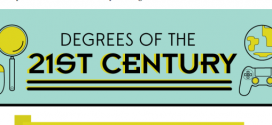Higher ed ROI has been in the news a lot lately, including when former Secretary of Education Bill Bennett made news by proclaiming that only a fraction of American colleges measured up to their price tags.
But the problem isn’t necessarily the quality of the education.
The problem, Bennett says, is people going to second-tier schools, majoring in less-marketable liberal arts fields, and taking on debt to do so.
According to Bennett’s assessment, this higher ed ROI (return on investment) dropoff is an unfortunately difficult one to resolve, given the combination of a free market (lots of schools to choose from) and human nature (lots of different goals).
“We have about 21 million people in higher education, and about half the people who start four year colleges don’t finish,” Bennett tells The Daily Ticker [a Yahoo! outlet]. “Those who do finish, who graduated in 2011—half were either unemployed or radically underemployed, and in debt.”
The good people at Education Sector’s blog, The Quick & the Ed, have just released a study on this subject; its hot-button relevance is helpfully summed up by this finding:
Over 80 percent of students now cite “to be able to get a better job” as a very important reason for attending college.
Furthermore, they seem to back up the implications of Bennett’s perspective:
…prospective students and their families [are] increasingly ask[ing] the value question: What will we get in return for our investment in college, especially if we are taking on significant debt? Often it’s not that students and families are questioning the value of college per se, just the value of attending certain colleges.
Along with Bennett’s comments, these findings indicate that ROI on a higher ed degree is based less on quality in particular, and more generally about the choice, follow-through and costs, as they relate to the students themselves.
Which, of course, brings us back to a favorite topic of conversation at Aspire: online education.
It seems clear that a return on investment can’t be strictly assessed financially, since money isn’t the only resource that goes into getting an education. What students bring to the class, to their studies, their work and their own academic discipline, is not only part of their educational experience—it will also be a key part of driving the future they create after they graduate.
And so, with this in mind, Bennett’s comments and Education Sector’s findings seem to indicate that online education is a sensible, credible and cost-effective option for people who can’t attend the top 10 schools in person—whether due to financial, age or geographic concerns.
If the academic quality and credibility of the school is a given, so much of the ROI rests on the students themselves. And that will be the same, whether their studies take place on-site or online.



